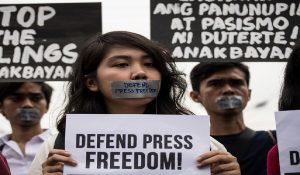04-05-2021
By SJA Jafri + Bureau Report
KARACHI/ KABUL/ PARIS: The International Press Institute, an international organization that protects journalism against censorship, warns that dictatorial-minded governments are stepping up their efforts to suppress free media.
According to the annual report of the institute, which was released on the occasion of World Press Freedom Day on May 3, within the last 12 month, 49 journalists from across the globe have lost their lives in the line of duty.
The report added that brutal crackdowns on the press are surfacing from all over the world.
“About 635 violations of press freedom were recorded worldwide over the last 12 months and at least 49 journalists were killed, with the highest number (84) press freedom violations recorded in India,” the report read.
Barbara Trionfi, Executive Director at the International Press Institute, says the rise in open attacks on press freedom and the targeting of journalists in authoritarian and non-ideological governments around the world is a bad omen for the future of democratic freedom.
“Anti-democratic governments are increasingly realizing that they could silence the media,” she said.
World Press Freedom Day observed worldwide
The “World Press Freedom Day” was observed across the world on Monday, May 3, with emphasis on defeating censorship and journalists resolving to keep pursuing their mission without compromising their ideals.
 According to UNESCO, the theme for this year’s World Press Freedom Day is “Information as a Public Good”.
According to UNESCO, the theme for this year’s World Press Freedom Day is “Information as a Public Good”.
“It serves as a call to affirm the importance of cherishing information as a public good, and exploring what can be done in the production, distribution and reception of content to strengthen journalism and to advance transparency and empowerment while leaving no one behind,” read a post on UNESCO’s website.
Three main points will be highlighted on this World Press Freedom Day and these include:
Steps to ensure the economic viability of news media;
Mechanisms for ensuring transparency of Internet companies;
Enhanced Media and Information Literacy (MIL) capacities that enable people to recognize and value, as well as defend and demand, journalism as a vital part of information as a public good.
When and how did it originate?
The World Press Freedom Day originated in a UNESCO conference that took place in Windhoek in 1991.
The event ended on 3 May with the adoption of the landmark Windhoek Declaration for the Development of a Free, Independent and Pluralistic Press.
Even after 30 years since the conference was held, the importance to spread and sustain information cannot be understated.
 Pressmediaofindia
Pressmediaofindia




